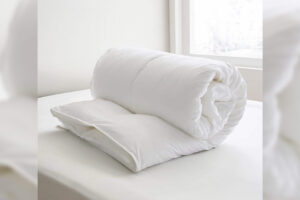Clothes alteration services are temporarily unavailable at all locations.
How Often Should You Clean Your Curtains? [Tips from Professional Cleaning Experts]
- By White's Laundry
- 18 August 2025
Curtains do more than frame your windows, they soften a room, add warmth, and create a welcoming atmosphere. But behind that elegance lies a hidden truth: curtains are magnets for dust, allergens, and odours.
If you’ve ever wondered how often clean curtains to keep your home healthy and fresh, the answer depends on your environment, lifestyle, and the type of fabric you own. While light cleaning at home is important, professional curtain cleaning ensures a deeper, longer-lasting clean that protects both your health and your investment.
Let’s explore why curtains need cleaning, how often you should clean them, and why professional care is often the best option.
Why Curtains Need Regular Cleaning
Curtains act like air filters. Every time you open a window, walk past, or switch on a fan, dust and microscopic particles settle into the fabric. Over time, this buildup can become more than just an aesthetic issue.
Dust and Allergen Buildup
Curtains trap pollen, pet dander, and everyday dust. Left unchecked, these allergens can trigger sneezing, coughing, and itchy eyes, especially in people with asthma or allergies.
Odour Absorption
Fabrics absorb smells from cooking, smoking, or even damp weather. These odours can linger, making a space feel stale no matter how much you clean elsewhere.
Health Impact
Unclean curtains can harbour bacteria, mould spores, and even dust mites. For households with children, pets, or elderly members, this can be a hidden health risk.
Fabric Preservation
Dust particles act like tiny abrasives, wearing down fibres over time. Regular cleaning helps maintain the colour, texture, and overall lifespan of your curtains.
Factors That Affect How Often to Clean Curtains
The ideal cleaning schedule varies from home to home. Here are some factors to consider:
Environment
- Homes in busy urban areas may face higher dust and pollution levels, requiring more frequent cleaning.
- Coastal homes are more prone to moisture, which can lead to mould and mildew.
Room Usage
- Kitchen curtains absorb cooking grease and odours more quickly.
- Living rooms see heavier dust accumulation due to higher foot traffic.
- Bedroom curtains may require less frequent cleaning if windows are kept closed.
Lifestyle
- Pets shed hair and dander, which cling to fabric.
- Children can cause accidental spills or stains.
- Smoking indoors leads to faster discolouration and odour buildup.
Fabric Type
- Heavy drapes tend to trap more dust.
- Light sheers may collect less dust but can discolour more quickly in sunlight.
- Delicate fabrics may require specialised handling, increasing the need for professional care.
How Often to Clean Curtains
Light Cleaning
You can maintain your curtains’ appearance by dusting or vacuuming them every 1–2 weeks using a soft brush attachment. This prevents dirt from embedding too deeply.
Professional Cleaning
- Every 6 months: High-traffic areas, homes with pets, smokers, or allergy sufferers.
- Every 12 months: Low-traffic rooms with minimal exposure to pollutants.
Situations That Call for Immediate Cleaning
- Stains or spills from food, drinks, or other accidents.
- After illness to reduce bacteria and allergens.
- Post-renovation or construction, when dust levels are high.
Professional Curtain Cleaning vs DIY
Many people try to wash curtains at home, but certain fabrics and situations require professional care. Here’s why:
Depth of Clean
Professional services use advanced methods like steam cleaning or dry cleaning to remove deep-seated dirt, bacteria, and odours that home washing machines can’t handle.
Fabric-Specific Methods
Different fabrics require different treatments. Professionals assess each curtain’s fibre content, lining, and finish before choosing the safest cleaning method.
Prevention of Damage
Home washing can cause shrinkage, fading, or misshaping. Professionals have the tools and techniques to clean without compromising the fabric.
Time and Effort Saved
Removing, washing, drying, and rehanging curtains can be time-consuming. Professional cleaning offers convenience and better results.
Signs It’s Time for Professional Curtain Cleaning
Not sure when your curtains last had a proper clean? Look for these tell-tale signs:
- Fabric looks dull, faded, or grey despite regular dusting.
- Persistent odours that don’t go away with airing.
- Increased allergy symptoms or respiratory discomfort.
- Stains that resist home spot-cleaning.
- Curtains feel stiff, limp, or uneven.
Common Professional Curtain Cleaning Methods
Dry Cleaning
Best for delicate fabrics like silk, velvet, or lined curtains. Uses solvents instead of water to avoid shrinkage and damage.
Steam Cleaning
Effective for sanitising and refreshing heavy drapes. The high temperature kills bacteria and dust mites while lifting dirt.
Industrial Machine Washing
Suitable for durable fabrics such as cotton or polyester blends. Ensures thorough rinsing and drying.
On-Site Cleaning
Ideal for large or fixed curtains that are difficult to remove. Professionals clean them where they hang using specialised equipment.
How to Maintain Curtains Between Professional Cleans
Even with professional cleaning once or twice a year, simple habits can keep your curtains fresher for longer:
- Vacuum weekly using a soft brush attachment.
- Spot clean immediately to prevent stains from setting.
- Use air purifiers to reduce airborne dust and allergens.
- Close windows during high-pollen or dusty days.
- Wipe nearby surfaces regularly to prevent dust transfer.
Conclusion
So, how often clean curtains? The short answer: give them a light clean every couple of weeks, and book a professional deep clean every 6–12 months depending on your environment, lifestyle, and fabric type.
Professional curtain cleaning isn’t just about appearance, it’s about maintaining indoor air quality, protecting your health, and preserving your investment in quality window treatments.
Set a reminder for your next professional clean, and enjoy a fresher, healthier home year-round.




